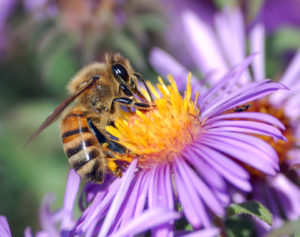It’s National Pollinator Week
 Initiated and managed by the Pollinator Partnership, National Pollinator Week, June 20-26, celebrates the pollinators that are vital to our ecosystem. Pollinators — including bees, birds, butterflies, bats and beetles — contribute to the growth of fruit, vegetables and many nuts, as well as flowering plants.
Initiated and managed by the Pollinator Partnership, National Pollinator Week, June 20-26, celebrates the pollinators that are vital to our ecosystem. Pollinators — including bees, birds, butterflies, bats and beetles — contribute to the growth of fruit, vegetables and many nuts, as well as flowering plants.
The decline of domesticated honey bee colonies has been a hot topic over the past several years. Some experts say that the domestic honey bee population has declined nearly 50 percent in the last 50 years. Wild honey bees, bumble bees and other pollinators have also experienced losses.
Potential causes have been debated and include: bee-keeping practices, diseases, use of certain pesticides and lack of nutritionally diverse nectar and pollen sources due to urbanization and agricultural monocultures.
Nine years ago the U.S. Senate’s unanimous approval and designation of a week in June as “National Pollinator Week” marked a necessary step toward addressing the issue of declining pollinator populations.
Here are a few fast facts from Pollinator.org:
- About 75 percent of all flowering plant species need the help of animals to move their heavy pollen grains from plant to plant for fertilization.
- Most pollinators (about 200,000 species) are beneficial insects such as flies, beetles, wasps, ants, butterflies, moths, and bees.
- About 1,000 of all pollinators are vertebrates such as birds, bats and small mammals.
- An estimated 1/3 of all foods and beverages is delivered by pollinators.
- In the U.S., pollination produces nearly $20 billion worth of products annually.
Treehugger.com offers four ways to participate in National Pollinator Week:
- Start a garden today. You can start small and grow what will keep you interested in gardening. Options include herb gardens, container gardens and wildflowers, just to name a few.
- Make your new garden pollinator friendly. Keep your flower selection simple. Grow plants that attract butterflies.
- Join a National Pollinator Week event. Visit the National Pollinator Week event page to find a local event.
- Educate Yourself on Pollinators. There are apps for your phone and websites such as PollinatorHealth.org, Great Pollinator Project, Pollinator.org and the U.S. Fish & Wildlife Service’s Pollinator page.
Massey Services is aware and alert to the concerns of pollinator health. Our service programs and product selections are designed to be environmentally responsible while being as effective as possible. Our landscape specialists and pest technicians have been trained to use alternate control measures or to delay treatment when plants are in bloom and pollinators are present.
In addition, we encourage the planting of “bee-friendly” gardens that will provide additional food sources and help keep bee populations healthy.